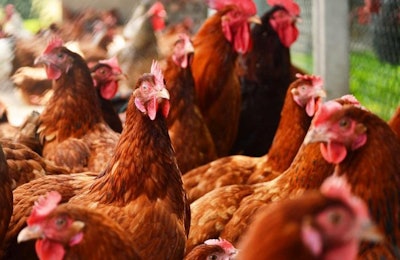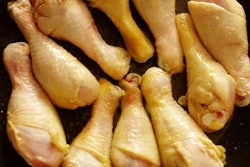
The US Department of Agriculture (USDA) will publish a final rule creating stricter animal welfare standards for organic livestock and poultry.
The rule, to be published in the Federal Register on January 19, will affect all livestock raised as part of the USDA’s National Organic Program. All animals will be required to be given enough space to lay down, turn around, stand up, fully stretch their limbs without touching other animals or the side of the enclosure, and otherwise express natural behaviors. The regulation, published in the final days of President Barack Obama’s administration, will establish new rules for housing, transportation and slaughter of organic poultry.

Graphic by US Department of Agriculture, Agricultural Marketing Service, National Organic Program
In a release, the USDA’s Agricultural Marketing Service said the rules will strengthen the integrity of the organic label.
“This rule is also about fairness for organic producers - it ensures that everyone competes on a level field and plays by the same rules,” AMS Administrator Elanor Starmer said.
The rules, proposed in April 2016, establish minimum indoor and outdoor space requirements for poultry; specify which physical alterations are allowed and prohibited and clarify how livestock must be handled throughout their life, including transport and slaughter, to ensure their health and well-being.
According to a January 18 report from the Associated Press, a proposed requirement for producers to provide enrichment to entice chickens to go outside was removed from the final rule. It was removed due to concerns about food safety and Salmonella.
Producers, politicans object
In a statement, United Egg Producers (UEP) said it was disappointed with AMS and the final rule.
“We had strong concerns over provisions related to outdoor access and the potentially significant – and prohibitive – cost implications of those changes on organic egg farmers,” David Inall, UEP senior vice president, said. “UEP is disappointed that long-accepted means of providing outdoor access, which are consistent with animal health, animal welfare and food safety, are being disallowed by this rule.”
The rule will no longer allow producers to use enclosed areas – called porches or verandas – as outdoor spaces. In April 2016 Herbruck’s Poultry Ranch Inc., a major producer of organic eggs, said the change would drastically affect its business.
Inall said the UEP is disappointed in how the USDA calculated the economic impact of the rule. He urged the incoming administration of President-elect Donald Trump to halt implementation of the rule so its true effect on egg farmers can be measured.
In a statement, National Pork Producers Council President John Weber called the rule an “unnecessary, unscientific midnight regulation.”
“These new standards will present serious challenges to livestock producers and add complexity to the organic certification process, creating significant barriers to existing and new organic producers,” Weber said. “The standards seem to be based on public perception – or USDA’s understanding of that perception – of what good animal welfare is and don’t reflect a consensus by experts in animal welfare and handling.”
In an email, Tom Super, a spokesman for the National Chicken Council (NCC), said the group is in the process of reviewing the extensive final rule. In July 2016, Ashley Peterson, the NCC’s senior vice president of scientific and regulatory affairs, told the USDA the rule “imposes unreasonable costs and requirements of doubtful benefit on organic farmers (and) presents grave risks to animal health.”
In a statement, US Rep. Mike Conaway, R-Texas, chairman of the House Committee on Agriculture, said he’s ready to roll back the rule if necessary.
“Not only do animal welfare standards go beyond the scope of the National Organic Program, the requirements regarding expanded outdoor access for poultry fly in the face of lessons learned from the recent and devastating outbreak of (highly pathogenic avian influenza), and are particularly concerning given the detection of the virus in a wild duck in Montana earlier this month,” Conaway said.
Timing of implementation
According to the USDA, the rules will be phased in during the five years following the publication of the final rule:
- Certified organic broiler operations must meet indoor space requirements within three years of publication of the final rule.
- All certified organic poultry operations must meet outdoor access requirements within five years of publication.
- Egg laying operations applying for organic certification three years or more after the publication of the final rule must meet all requirements to obtain certification.
In a blog post on the final rule Starmer said most organic livestock and poultry producers already comply with the new requirements.


















